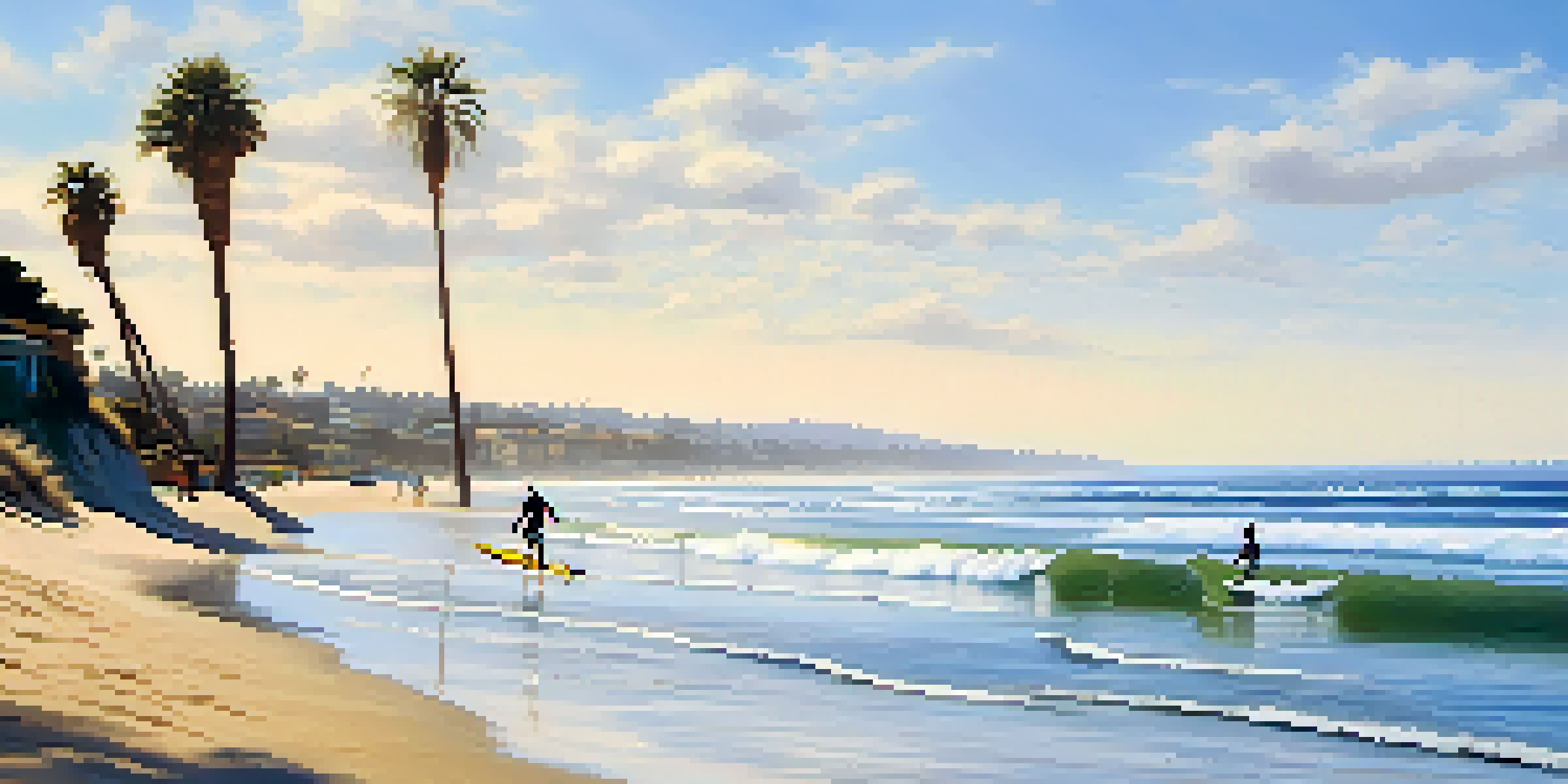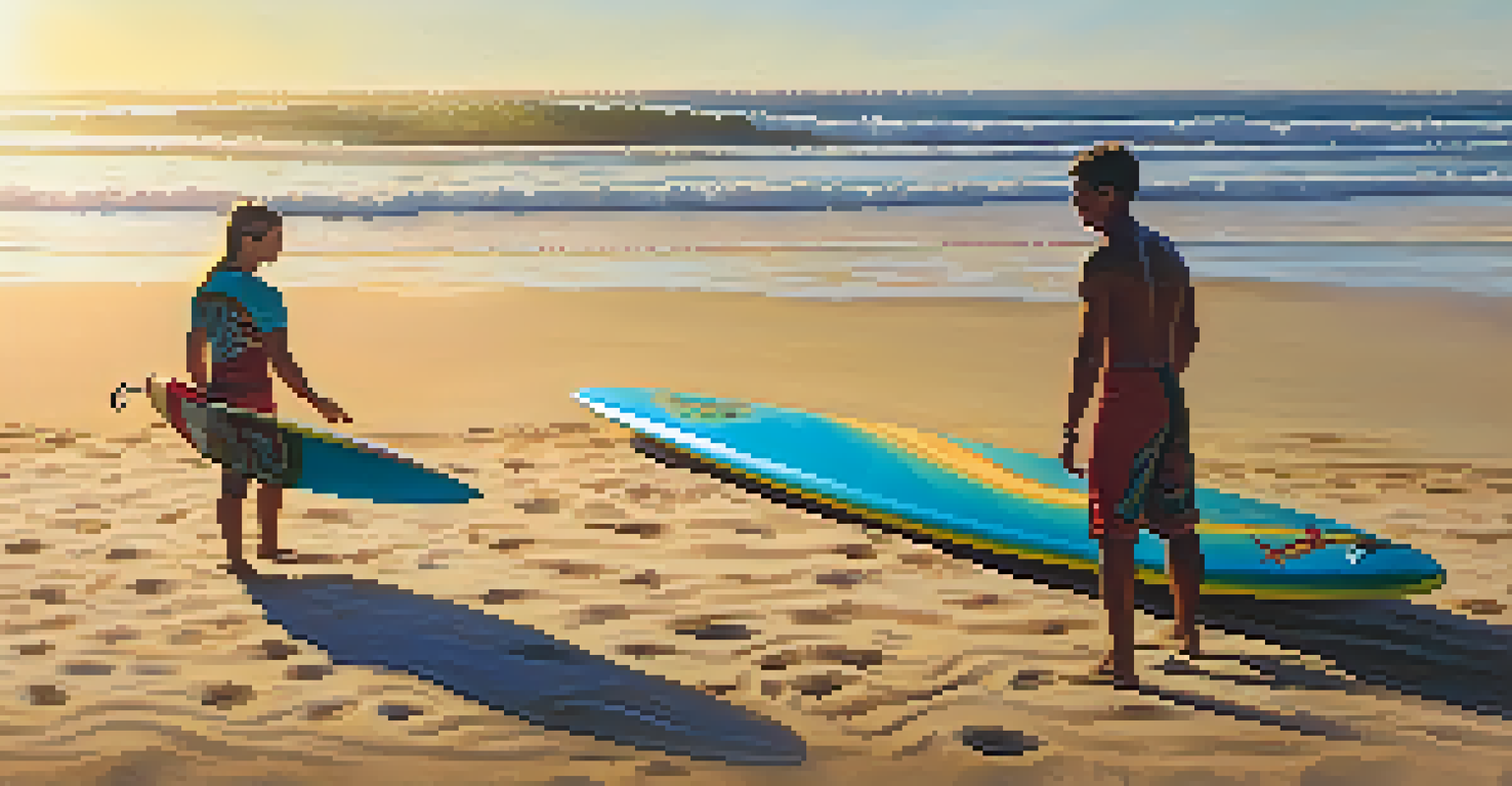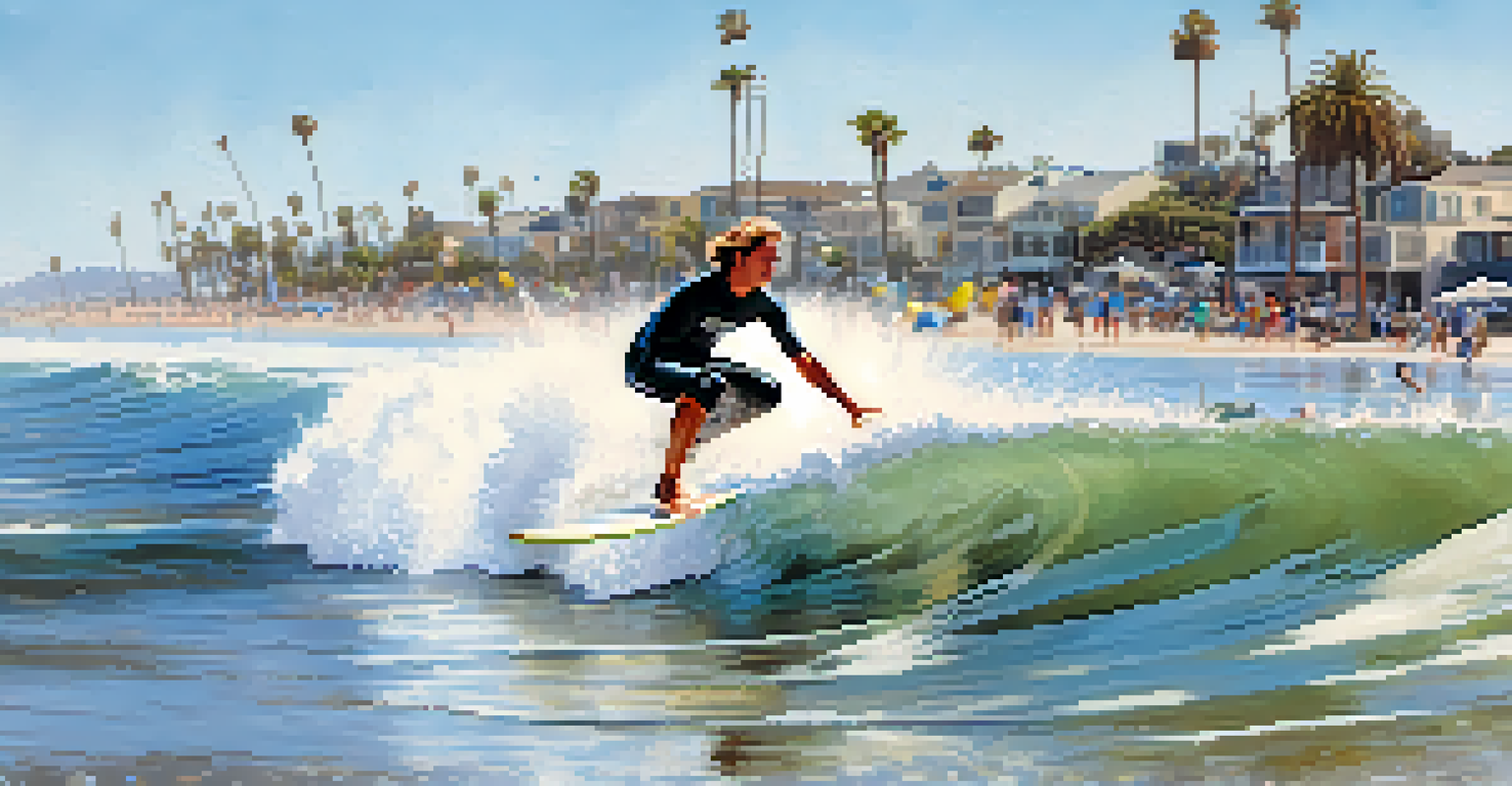Surfing Lessons for Beginners: Ride the Waves in San Diego

Why San Diego is Perfect for Beginner Surfers
San Diego boasts some of the best surfing spots for beginners, thanks to its gentle waves and favorable weather. With consistent swells and sunny days, aspiring surfers can learn in a welcoming environment. Plus, the vibrant surf culture here means you'll find plenty of support and camaraderie among fellow beachgoers.
Surfing is like a dance, and the ocean is my partner.
The variety of beaches, like La Jolla Shores and Mission Beach, allows beginners to choose the right setting for their skill level. These locations feature sandy bottoms, which are safer for falls and provide a more forgiving experience. All of this makes San Diego an ideal playground for those just starting to ride the waves.
Plus, the local surf schools offer tailored lessons that cater specifically to beginners, ensuring that you learn the basics in a safe and enjoyable manner. With experienced instructors to guide you, discovering the thrill of surfing becomes not just an adventure, but a passion.
What to Expect in Your First Surfing Lesson
In your first surfing lesson, you can expect to cover the essential basics, including paddling techniques, how to pop up on your board, and riding your first wave. Your instructor will start with some beach instruction, where you’ll learn about surf etiquette and safety tips. This foundational knowledge is crucial for a fun and safe surfing experience.

Once you hit the water, the real fun begins! You'll practice paddling out and positioning yourself for waves. Even if you don’t catch a wave right away, each attempt will teach you something new about balance and timing, both vital for becoming a proficient surfer.
San Diego: Ideal for New Surfers
With its gentle waves and supportive surf culture, San Diego is a welcoming place for beginners to learn surfing.
Don’t worry if you wipe out a few times; it’s all part of the learning process! Your instructor will be right there to encourage you, making sure you’re having a great time while building your skills.
Essential Gear for Beginner Surfers
Having the right gear can make all the difference in your surfing experience. As a beginner, most surf schools provide boards and wetsuits, so you don’t need to invest heavily upfront. However, a comfortable swimsuit and sunscreen are essential to protect your skin from the sun's rays while you’re out in the water.
The best surfer out there is the one having the most fun.
A good quality surf wax is another item you might want to consider, ensuring your board provides the grip you need when paddling and popping up. Depending on the season, a wetsuit may also be beneficial, keeping you warm during cooler months while enhancing your buoyancy.
Finally, don’t forget to bring water and snacks to keep your energy up during breaks. Staying hydrated and fueled will help you enjoy your lessons even more!
Understanding Surf Etiquette and Safety
Surf etiquette is essential for maintaining a safe and enjoyable environment for everyone in the water. As a beginner, you’ll learn the importance of waiting your turn and respecting the right of way. Understanding these unwritten rules not only keeps you safe but also helps you integrate into the surfing community.
Always be aware of your surroundings and avoid dropping in on someone else's wave, which can lead to dangerous situations. If you're unsure about something, don't hesitate to ask experienced surfers or your instructor for guidance; they’ll appreciate your willingness to learn.
Key Skills for First Lessons
Your initial surfing lessons will focus on essential techniques like paddling, popping up, and understanding surf etiquette.
Safety is paramount, so make sure you understand the conditions of the day, including wave sizes and currents. Your instructor will help you assess the situation, ensuring you feel confident and secure while out in the surf.
Building Your Surfing Skills Over Time
Like any skill, surfing requires practice and patience. After your initial lessons, consider joining a surf club or finding a group of friends to practice with regularly. The more time you spend in the water, the more comfortable and skilled you’ll become at catching waves.
Don’t be discouraged if progress feels slow at first; every surfer has been there! Celebrate small victories, like successfully paddling out or standing on your board for the first time. Keeping a positive mindset will make your journey much more enjoyable.
Remember, even seasoned surfers continue to learn and improve, so embrace the process. Each surf session is an opportunity to gain new insights and techniques, bringing you one step closer to mastery.
Best Times to Surf in San Diego
San Diego offers year-round surfing opportunities, but certain times can be more favorable for beginners. Typically, the summer months from June to August see smaller, gentler waves, making it easier for newbies to practice. Morning sessions are often calm and uncrowded, giving you more space to learn.
Fall can also be a great time to surf, as the water remains warm while the swells become more consistent. Many surfers consider autumn the best season overall due to the combination of pleasant weather and favorable conditions.
Choosing the Right Surf School
Finding a surf school with experienced instructors and a focus on safety can enhance your learning experience and enjoyment.
Keep an eye on local surf reports for daily conditions, as they can fluctuate significantly. By planning your surf days around the best conditions, you'll maximize your learning experience and enjoyment.
Finding the Right Surf School for You
With many surf schools in San Diego, choosing the right one can seem overwhelming. Look for schools with experienced instructors, positive reviews, and a focus on safety. Many schools offer group lessons, which can be a fun way to meet fellow beginners and share the experience.
Consider the size of the group; smaller lessons often provide more personalized attention, helping you progress faster. Additionally, some schools may offer packages that include equipment rental, making it easier to get started without a hefty investment.

Take the time to research different schools, and don’t hesitate to reach out with questions. A good surf school will be happy to discuss their approach and help you find the right fit for your learning style.